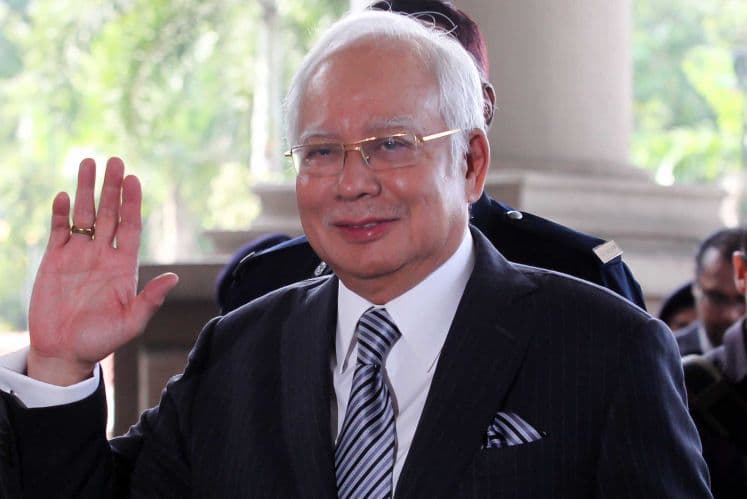
KUALA LUMPUR (July 31): July has been a month of new records for Malaysia across multiple fronts, from the judiciary to politics to the equity market.
The most recent and explosive first would be the conviction of a former Prime Minister of graft charges, for which he would have to spend a dozen years in jail. Immediately after, political rumblings escalated as past and present alliances were tested.
Over at the equity market, retail investors made a strong comeback in Bursa Malaysia after years of disinterest, which pushed stock prices and trading volumes to previously unseen levels.
Najib found guilty of swindling SRC
After two years of trial, Datuk Seri Najib Razak was found guilty on seven charges related to the siphoning of RM42 million from Government-owned company SRC International Sdn Bhd when he was Malaysia’s Prime Minister.
He was sentenced to spend 12 years in jail and slapped with an RM210 million fine. Out on an RM2 million bail, he has filed an appeal against the High Court's decision.
Market boomed, system crashed
In the market, a critical mass of retail investors pushed Bursa Malaysia's daily trading volume to over 12 billion shares — a new record high volume for the stock exchange — not just once, but twice in the month of July. This is more than five times the volume seen at the start of the year.
Amid this unprecedented level of retail activities, Bursa’s system crashed on July 16, which resulted in trading being halted across the entire exchange. Several online trading platforms also continued to experience issues up until yesterday.
The lion’s share of retail inflow went into glove stocks, where all eight incumbent glove counters breached new highs every other day last month — Top Glove Corp Bhd, Hartalega Holdings Bhd, Supermax Corp Bhd, Kossan Rubber Industries Bhd, Comfort Gloves Bhd, Careplus Group Bhd, Rubberex Corp Bhd and HLT Global Bhd.
Turmoil in PH, PN, Sabah and Dewan Rakyat
It was no less exciting in the political scene when the July Parliament sitting kick-started with the removal of Pakatan Harapan-appointed Dewan Rakyat Speaker, Tan Sri Mohamad Ariff Md Yusoff, by the Perikatan Nasional (PN) Government.
Never once in the 800-year-history of the United Kingdom's House of Commons has a House Speaker been removed before a Parliamentary term ended.
Ariff said he does not know of any other country that had replaced their Speaker except for Trinidad and Tobago in the 1990s when the Speaker was removed for being involved in corruption.
The development also hinted at the possible outcome for the proposed no-confidence vote against Prime Minister Tan Sri Muhyiddin Yassin. His predecessor and critic Tun Dr Mahathir Mohamad, the one pushing for the vote of no-confidence, has filed a legal challenge against PN’s appointment of new Speaker Datuk Azhar Azizan Harun and his deputies — one of whom was Datuk Azalina Othman, the first woman Deputy Speaker.
At the same time, cracks appear to be showing in PN following Najib’s guilty verdict in court. Yesterday, Umno chief Datuk Seri Ahmad Zahid Hamidi announced that the party would not formally join the loose ruling coalition, leaving Muhyiddin's Government in a delicate balancing act. Ahmad Zahid, however, noted that Muhyiddin’s Parti Pribumi Bersatu Malaysia had expressed interest in joining the Umno-PAS coalition of Muafakat Nasional. But whether that will work out remains to be seen. "Bersatu's wish will be discussed with PAS in detail," Ahmad Zahid said.
On the other side of the fence, Pakatan Harapan (PH) continues to be unable to reach a consensus on its leadership, with DAP and Amanah in support of Dr Mahathir, while the Datuk Seri Anwar Ibrahim-led PKR stood in opposition.
Across the South China Sea, PH-friendly Warisan is having issues of its own. Party president and Opposition Prime Minister candidate Datuk Seri Shafie Apdal had to seek the dissolution of the Sabah State Assembly yesterday to prevent Umno veteran and former Sabah Chief Minister Tan Sri Musa Aman from forming a new State Government after he claimed to have received the backing of a simple majority of the Assemblymen.
Unemployment problems and a possible COVID-19 second wave
Meanwhile, the situation in the wider Malaysian economy and in the fight against COVID-19 remains volatile.
Malaysia’s unemployment rate spiked to 5.3% in May — the highest in 30 years — representing 826,100 individuals being jobless. At the same time, there was concern about rising new cases following the relaxation of the movement control order in June.
Daily new cases hit its one-month high of 39 daily new cases on July 28. Active cases rose from 63 on July 9 — its lowest since March — to 223 cases as at July 30.
Fuelling the concerns of further outbreak was the recent mass gathering of thousands in front of the Kuala Lumpur Court Complex on the day that Najib's SRC trial outcome was due. This is on top of the alarming incidents of Malaysians breaching home quarantine that had gone viral on social media. At least one person has tested positive for the coronavirus.

